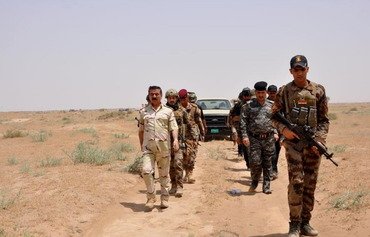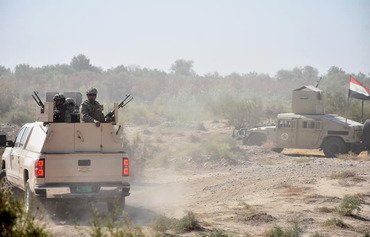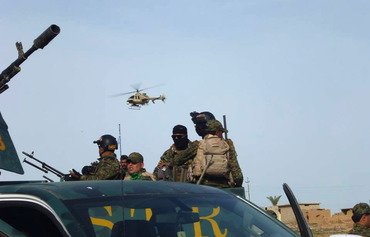Iraqi forces and tribesmen killed four "Islamic State of Iraq and Syria" (ISIS) elements during an operation that kicked off Monday (September 17th) in the northern Salaheddine city of al-Sharqat, a security official said.
The large-scale security operation seeks to "eradicate ISIS cells in al-Sharqat", Sheikh Asham Subhan al-Jubury, commander of the 51st tribal brigade in al-Sharqat, told Diyaruna on Tuesday.
Forces from the Salaheddine Operations Command, Salaheddine police directorate, al-Sharqat police, Iraqi army and 51st tribal brigade are taking part in the operation, he said.
"The operation focused on the village of Kanous and the surrounding areas, especially the area of Hawijat Uwaibad and the islands in the Tigris river, where intelligence sources indicated a number of terrorists were hiding," he said.
![Security forces and tribesmen prepare to raid ISIS hideouts during a Monday (September 17th) security operation in al-Sharqat. [Photo courtesy of Salaheddine police directorate]](/cnmi_di/images/2018/09/18/14547-Sharqat-forces-deploy-600_384.jpg)
Security forces and tribesmen prepare to raid ISIS hideouts during a Monday (September 17th) security operation in al-Sharqat. [Photo courtesy of Salaheddine police directorate]
"We first surrounded the target areas and then attacked the enemy sites from the air and from the ground, killing four of their elements so far," he said.
Two of the group's rest-houses were destroyed, one of which was a small house near the Kanous village water project, he said, as well as two tunnels.
"Our forces are continuing the operation until all the terrorist elements in hiding are eliminated," he said. "Our information confirms that nine terrorists are still alive; we have surrounded them well, and will not allow them to escape."
Ongoing security operations
Similar operations are carried out "almost every week" by joint forces of the Iraqi army, police and tribes, with air support from the international coalition, al-Jubury said.
These operations seek to rid the remote areas in and around al-Sharqat of ISIS remnants, he said, and also target extremist elements in the western Kirkuk district of al-Hawijah and the southern Ninawa district of Hatra.
"Two weeks ago, we carried out a campaign in Jabal Makhoul and killed 16 terrorists, and last month we had large and effective campaigns, including one in which we killed 10 terrorists to the west of al-Siniya," he said.
ISIS remnants no longer have the power to carry out large-scale acts of terrorism, he said.
"They move only during the night and at limited times to carry out small operations, such as detonating an improvised explosive device (IED) or a kidnapping or killing, to deliver a message that they still exist," al-Jubury said.
"Our forces are in control, and the enemy has no ability to confront them directly or even hide for a long time in its bases," he added.

![Iraqi policemen prepare to launch a boat as part of an operation kicked off Monday (September 17th) to hunt down ISIS remnants in al-Sharqat. [Photo courtesy of Salaheddine police directorate]](/cnmi_di/images/2018/09/18/14546-Sharqat-police-boat-600_384.jpg)






